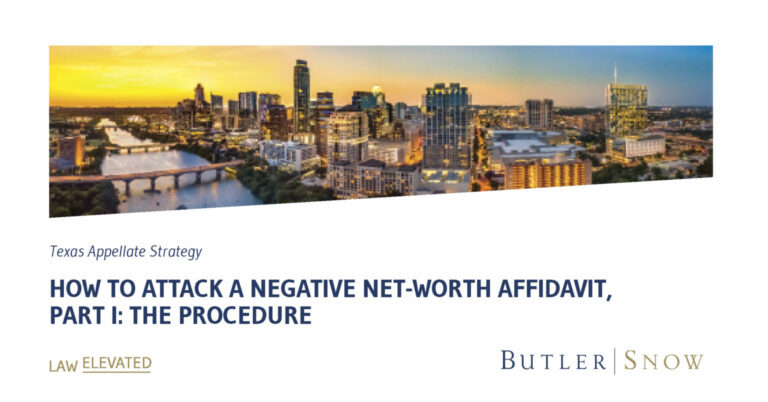You’ve obtained a money judgment, and your client is anxious to get paid. The judgment debtor files a notice of appeal and an affidavit claiming it has a negative net worth. The judgment debtor argues it is entitled to supersede the judgment without security.
Now what?
This post is the first of a two-parter explaining the procedure for contesting a negative net-worth affidavit and offering a case study for successfully following that procedure.
Supersedeas Methods Generally
Filing a notice of appeal generally does not prevent a judgment from being enforced. To avoid execution pending appeal, a judgment debtor must supersede the judgment by posting security.
The judgment debtor may avoid enforcement of the judgment by (1) filing a written agreement to suspend enforcement; (2) filing a supersedeas bond (the most common approach); (3) depositing cash with the trial court clerk instead of a bond; or (4) providing alternate security ordered by the court. Tex. R. App. P. 24.1.
Supersedeas by Affidavit
In 2003, the Texas Legislature made it easier for judgment debtors to appeal a money judgment by imposing supersedeas caps. The amount of security for money judgments must not exceed the lesser of 50 percent of the judgment debtor’s net worth or $25 million. Tex. R. App. P. 24.2(a) & (c). The rule does not define “net worth,” but cases define it as total assets less total liabilities, determined under generally accepted accounting principles (GAAP).
A judgment debtor wishing to supersede based on net worth must file an affidavit stating “complete, detailed information concerning the debtor’s assets and liabilities from which net worth can be ascertained.” Tex. R. App. P. 24.2(c)(1). An affidavit meeting these requirements is prima facie evidence of the debtor’s net worth for purposes of establishing the amount of security required to supersede the judgment. Id.
Courts have concluded that a judgment debtor who can swear to a negative net worth need not put up any security at all to prevent execution. This scheme thus encourages a judgment debtor to get creative and file a negative net-worth affidavit to maintain the status quo during appeal.
Procedure for Challenging the Affidavit
A judgment creditor may file a contest to the debtor’s net worth and conduct discovery. Tex. R. App. P. 24.2(c)(2). The contest need not be sworn. Id.
A preliminary issue to consider raising in a contest is whether the net worth affidavit provides the required level of detail, but most contests will require an evidentiary hearing. At the hearing on a contest to the judgment debtor’s claimed net worth, the judgment debtor bears the burden of proof. Tex. R. App. P. 24.2(c)(3).
Rule 24.2(c) requires the trial court to “issue an order that states the debtor’s net worth and states with particularity the factual basis for that determination.” Tex. R. App. 24.2(c)(3). But the trial court has discretion to consider whether the judgment debtor’s claimed assets and liabilities are accurate in light of all of the evidence.
Some decisions have held that the trial court need not determine a specific net-worth amount if it finds that the judgment debtor failed to meet its burden of proving net worth. In this situation, the trial court may set the bond under the general rule requiring judgment debtors to post a bond, deposit, or security equaling the sum of compensatory damages awarded in the judgment, interest for the estimated duration of appeal, and costs awarded in the judgment.
In Part II, I’ll provide a roadmap for successfully contesting a negative net-worth affidavit and forcing the judgment debtor to either post security or face execution on the judgment pending appeal.
